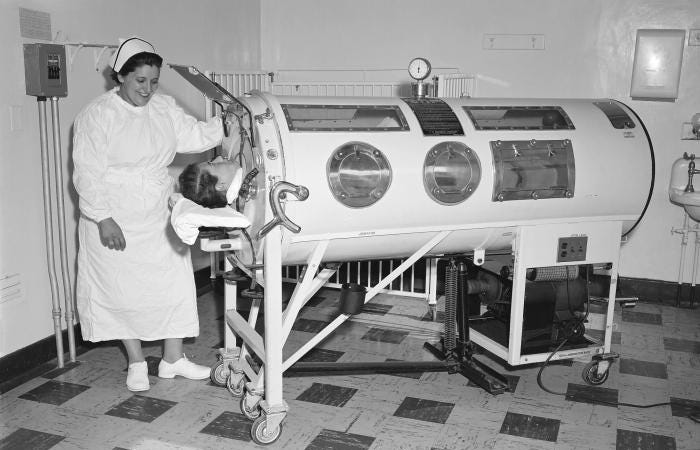In 1955 Jonas Salk announces his polio vaccine is ready to be distributed by mass inoculation. The vaccine is highly effective against the virus that at the time strikes 58,000 people a year, mostly children, killing or crippling thousands.
Eisenhower’s Secretary of Health, Education and Welfare Oveta Culp Hobby, a strong opponent of socialized medicine, resists having the federal government administer the shots. A compromise by which states would administer the vaccine with federal grants is worked out and the first wave is set to be distributed.
But Representative Mallory Tepper Gruen (D.-Ga.) introduces legislation to block the vaccine as an “untested and atheistic assault of the bodily sovereignty of American children.” She raises the specter of “an army of bureaucrats going door to door ramming their needles into our little boys and girls on the say-so of Mr. Salk.” Salk is summoned to the House for hearings, at which Gruen asks him how, as a Jew, Salk can know what effect the vaccine will have on Baptist children.
Gruen is joined in her resistance by Senator John Ronson (D.-Wisc.), who proposes, “If the one-worlders and beatniks want this so-called vaccine, let them raise the money themselves and take it in their coffee-houses and Communist cell meetings.”
Nonetheless inoculations go forward. But in the Cutter Incident, a batch of vaccine containing live virus infects thousands of children with polio virus, paralyzing 200 and killing 10. After an investigation, public health officials want to continue with the inoculations, but Gruen and dozens of other members of Congress demand Salk’s arrest and the suspension not only of polio vaccinations, but of all vaccinations, including those for smallpox, diphtheria, rubella, etc.
“It’s plain as day these same skull-cap scientists who invented the drugs that make our children into hop-heads and the social theories that cause Negro unrest in our cities are now killing our children,” Senator Ronson says in a nationwide radio address.
Gruen says the Cutter Incident proves vaccines are against the will of God and, rather than protect Americans, they “make our immune systems soft and vulnerable to whatever new diseases the Russians are cooking up in their germ warfare laboratories. Maybe this Salk is their new Julius Rosenberg!”
Salk is put in protective custody; Hobby resigns and, in a rare bi-partisan gesture, Eisenhower replaces her with Jackie Kennedy, the wife of Massachusetts Senator John F. Kennedy. “Let us go forward with vim and vigor,” the new Secretary says in a speech, “rather than with these dangerous inoculations.”
In the next few years polio continues to rage, as do several once-eradicated viral diseases including influenza, which kills a half-million Americans and brings the public masking of 1917 back into fashion. Jackie Kennedy resigns her cabinet post to help her husband with his ailing back; no one is found to take the post and Eisenhower adds it to Vice-President Nixon’s portfolio; at Nixon’s urging Eisenhower calls for a National Day of Prayer. Most world nations close their borders to the United States. The dictator Fulgencio Batista is coerced into allowing entry to Americans, quickly leading to a disease wave that destroys the Cuban economy. The island’s slot machines are airlifted to Monte Carlo.
Republicans blame the multi-epidemic on Russia and some call for war, but Eisenhower’s advisors tell him that the United States has been too weakened by disease to prevail in such a conflict.
In 1959 Joseph P. Kennedy, father of the Senator, announces the development of “patriotic elixirs” that will protect consumers from the multiple disease outbreaks. The FDA claims these are just the outlawed vaccines under a different name and the Department of Justice brings suit. The Kennedys retain Roy Cohn as counsel. A public outcry causes the government to relent and the FDA quickly re-authorizes all the vaccines. Eisenhower invites John Kennedy and his brother Bobby to golf at Augusta National, cancelling a date with Nixon. Drew Pearson reports Nixon was overheard telling friends he would “blow Jack Kennedy’s head off one day.”
John F. Kennedy becomes such a prohibitive favorite for the 1960 Presidential election that presumed Republican nominee Richard Nixon withdraws from contention, as do most other candidates, leaving the nomination to Arizona Senator Barry Goldwater, who loses in all fifty states. (Mallory Tepper Gruen, running on a “better infected than injected” platform, carries Alabama and Mississippi.) Kennedy is shot to death in 1962 by Richard Nixon at a Washington Press Club event. “A man can only take so much,” says Nixon as he is brought into custody.




White folks are sure riled up about things these days. .Never hear much about "white unrest" though.
"The island’s slot machines are airlifted to Monte Carlo."
That's a great sentence!
I bet if we included say, a five pack of oxycontin with each vaccine we lick most of this " anti-vax bullshit in a couple of weeks. JD's people would be coming down out of the hollers by the pick-up load to get a shot. They'd be getting it every other week. Some every other day if they could! Put them in blister packs.Makes it easier to crush them up without losing any powder.
So I'm told.
Ah, the good old days before everyone “did their own research” and considered themselves their own “expert.”